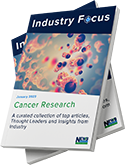New insight on the uptick in colorectal cancer diagnoses and deaths among younger people
For years, colorectal cancer was believed by many to primarily impact older people; however, in recent years, there has been an uptick in colorectal cancer diagnoses and deaths among younger people ranging in age from their mid-20s to late 50s. Howard S. Hochster, MD, FACP, director of the Gastrointestinal Oncology Program and associate director for Clinical Research at Rutgers Cancer Institute of New Jersey; and director of Oncology Research, RWJBarnabas Health, shares his expert insight on this topic.
Young adults and the alarming rise of colorectal cancer
According to the National Cancer Institute, the rate of colorectal cancer in adults younger than 50 years of age has doubled since the 1990s. The most recent data, which tracked the incidence of colorectal cancer from 2011 to 2016, revealed an up to two percent per year increase among people under 50. It is estimated that by 2030, approximately 1 in 10 colon cancers and 1 in 4 rectal cancers will be diagnosed in people under 50 years old. This data prompted the United States Preventative Task Force (USPTF) and American Cancer Society to update their screening recommendations to age 45, rather than 50 in 2021.
Factors driving the rise of colon cancer in younger people
Cancer Research eBook

The exact factors driving this rise in colorectal cancers in young patients remains unclear. Research suggests that lifestyle factors such as poor diet, obesity and heavy alcohol use can contribute to the onset of colorectal cancer, but none have been identified as the exact cause of this recent trend, and gene sequencing of tumors across age groups has not shown major differences. Researchers are actively working to better understand the factors associated with this rise in incidence.
For young people, staying aware and knowing the symptoms can be lifesaving
Some symptoms include rectal bleeding with or without pain, blood in the stool, a change in bowel pattern, bloating, cramping, weight loss without dieting and/or fatigue. Younger people may not seek colon cancer screening upon their first symptom because of a misconception that it's an unlikely diagnosis. This can delay diagnosis, which gives the cancer time to progress to a later stage. Earlier screenings along with recognizing the signs of colorectal cancer and taking them seriously may help curb this trend. It is important to talk to your doctor if you think something is wrong. And if the symptoms persist, see a gastroenterologist for evaluation. Experts also recommend eating a balanced low-fat diet high in fruits and vegetables, reducing alcohol consumption, preventing or stopping tobacco use, and increasing physical activity are measures that people can take to help reduce their risk of colorectal cancer as well as other cancer types.
Rutgers Cancer Institute of New Jersey
Posted in: Medical Condition News
Tags: Alcohol, Bleeding, Bloating, Blood, Cancer, Colon Cancer, Colorectal, Colorectal Cancer, Diet, Dieting, Doctor, Fatigue, Gene, Gene Sequencing, Obesity, Oncology, Pain, Physical Activity, Research, Tobacco, Vegetables, Weight Loss
Source: Read Full Article
